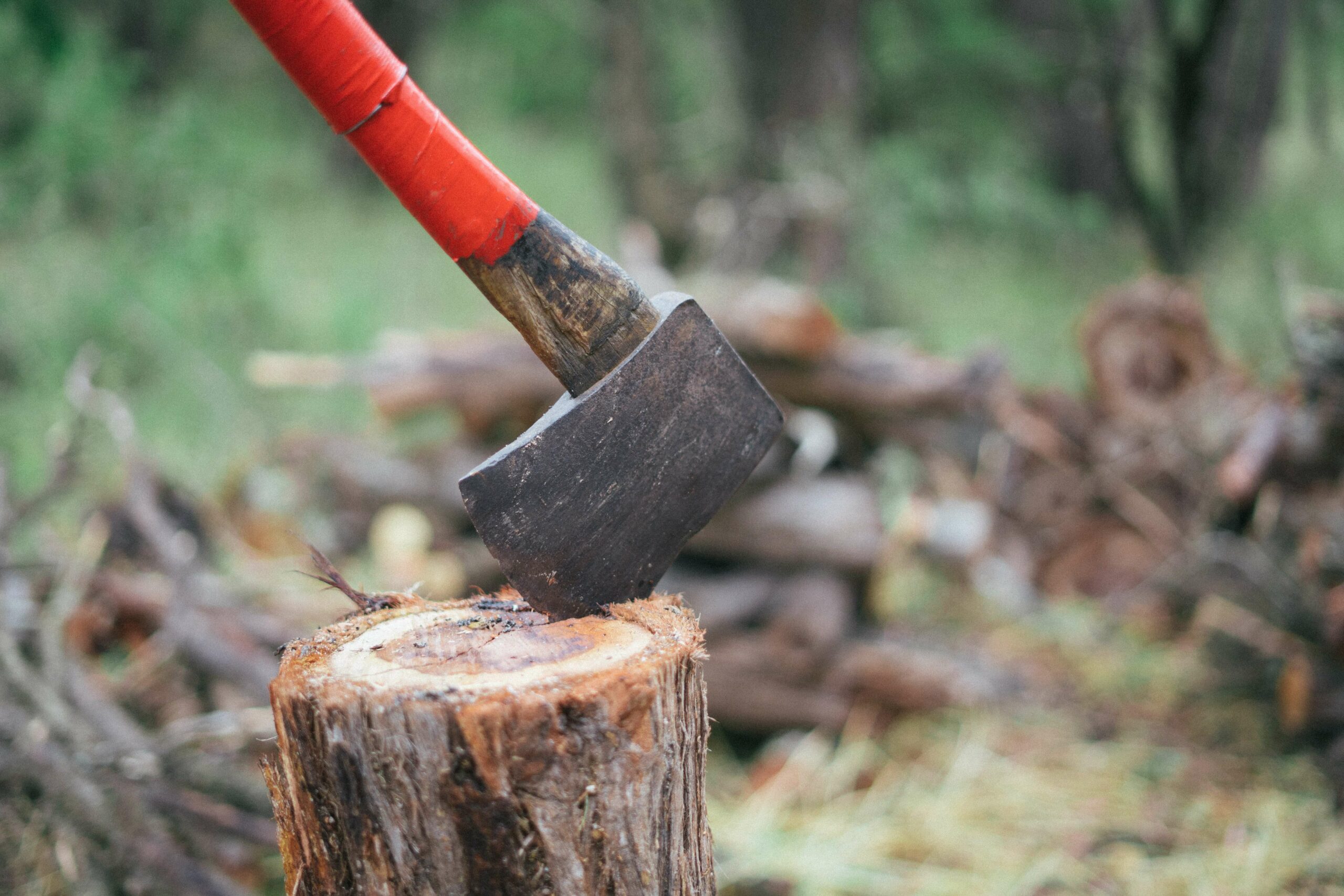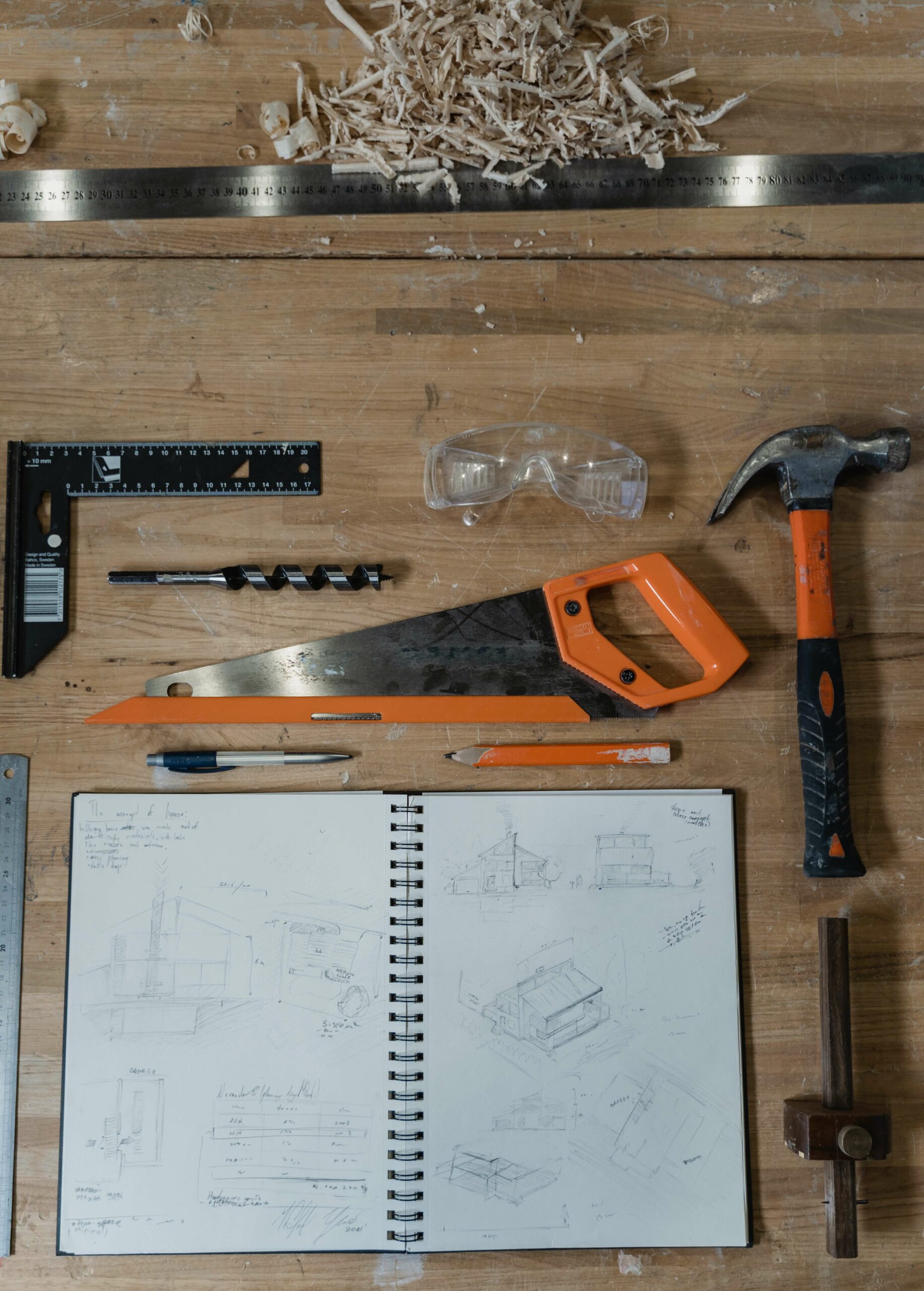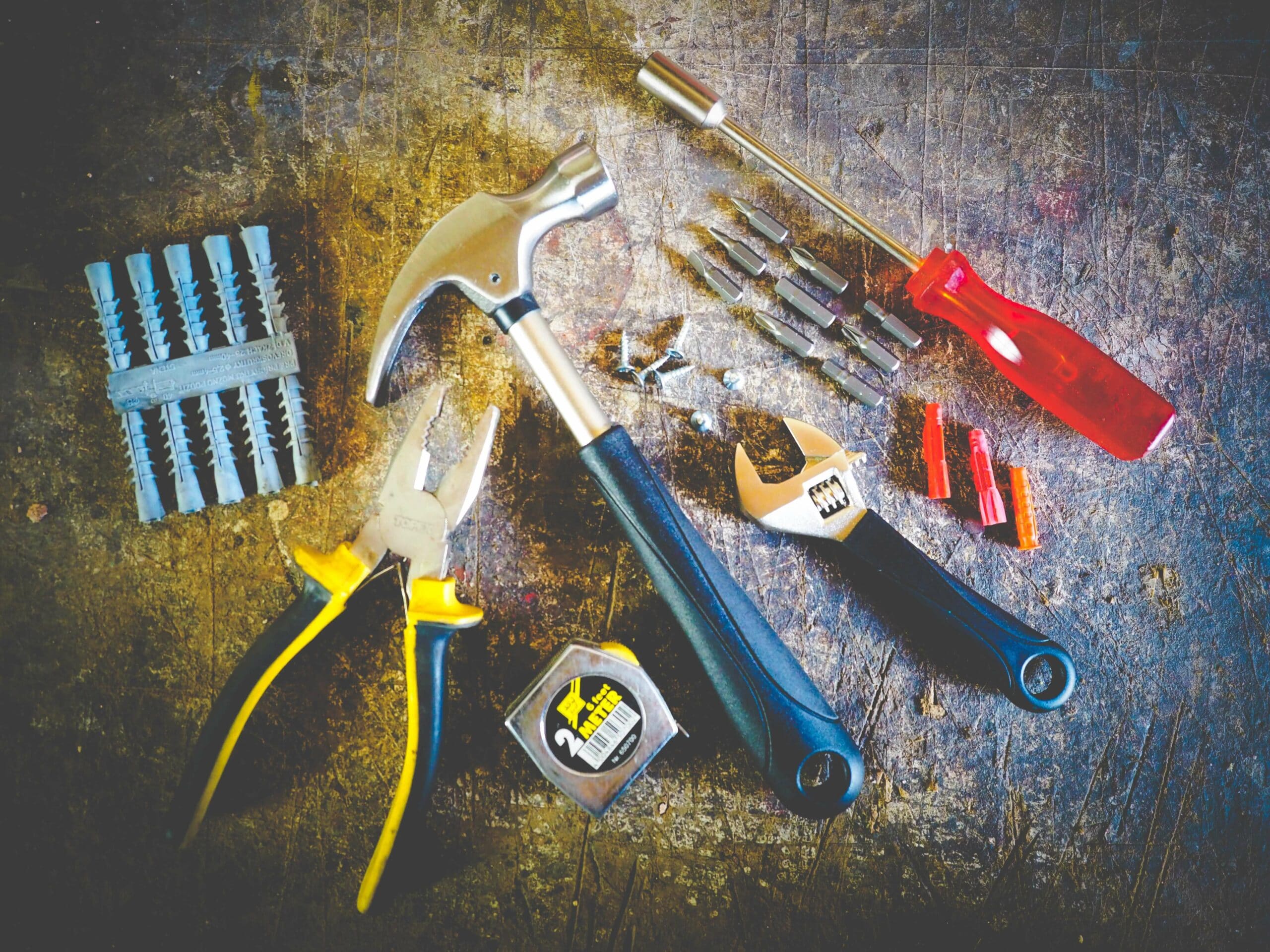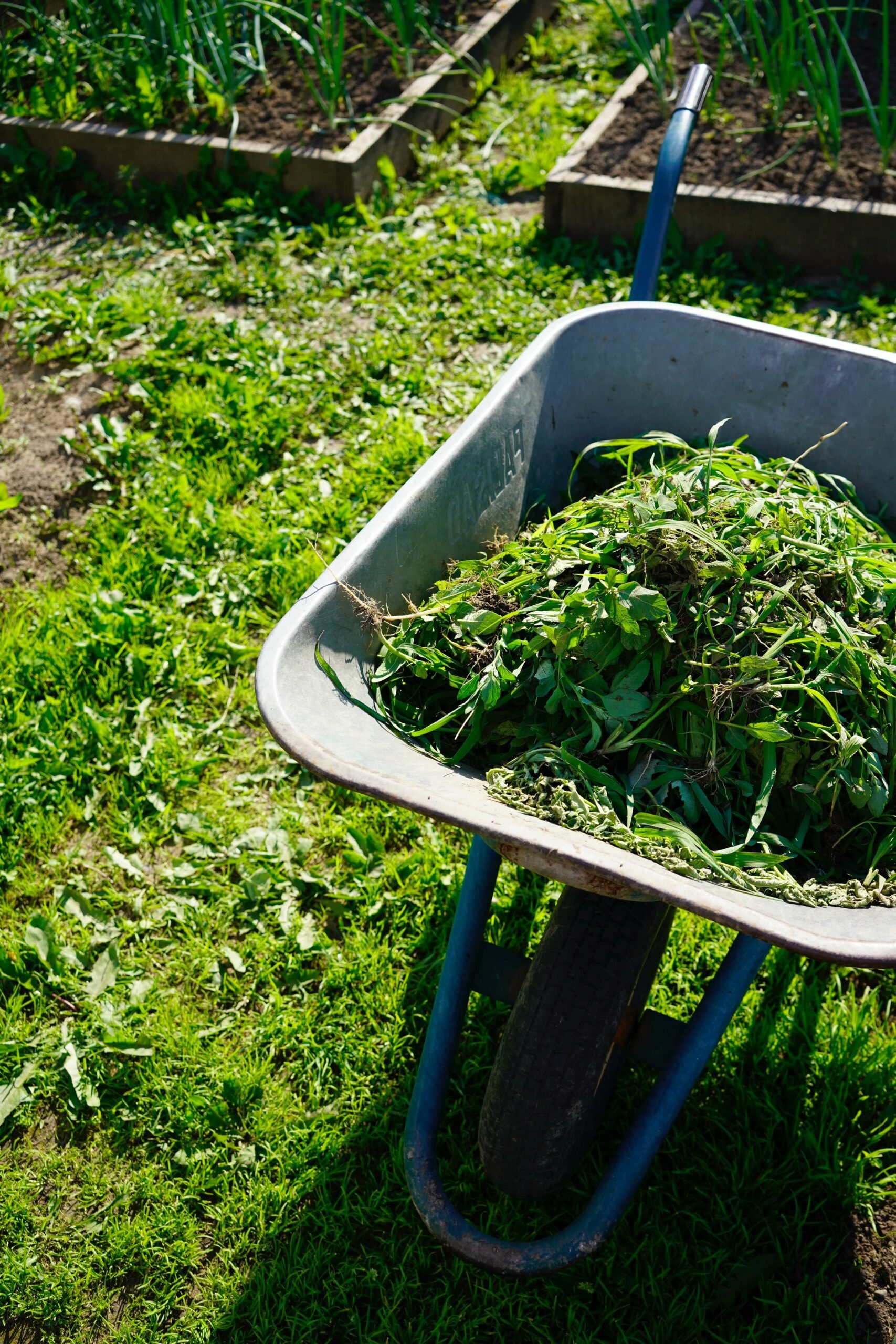Living off-grid requires a lot of tools. If you plan to pursue an off-grid lifestyle, be prepared. Part of getting away from it all is doing most of the work yourself. You need the appropriate tools to be successful when living off-grid.
We have accumulated a list of required and optional off-grid tools. The climate and topography where you will be living may render some of these items useless. In other places, they will be an absolute necessity. It is better to err on the side of caution and have a tool you don’t often use than not to have it when you need it.
We have organized the tools on our list by the type of work they are for: agricultural, woodworking, mechanics, plumbing, and general-purpose.
Agricultural Tools
Shovels
There are many types of shovels available at your local hardware store. Each style has a primary function. The work you plan to do will determine the shape, size, and weight of the shovels you choose. Do not skimp on the quality, as a cheap shovel will not last long.
Transfer Shovel
These are sometimes called square shovels. They are designed to move loose material. The flat shape makes them perfect for scooping loose soil from a pile. They also work well for leveling a rough area. They can be used to dig in soft soil or garden areas where the soil has already been worked.
Round or Pointed Digging Shovel
As the name implies, round and pointed shovels are for digging. The contoured shape of the blade allows these shovels to cut through compacted or hard soil. The blades are generally heavier than transfer shovels. When breaking ground with digging shovels, it is common to sharpen the blade’s leading edge.
Trench Shovel
These shovels are similar to round digging shovels, but the blade is narrower and taller. Use this shovel to cut trenches for underground pipes or buried electrical cables. The narrow blade also comes in handy for forming gutters to drain water collected in low areas.
Axes

Like shovels, there are many types of axes. Not all are for cutting wood. There are several digging axes. A modern survival axe can have wooden, fiberglass, or plastic handles. The old-fashioned hickory handle is still the best. Of course, they cost a little more.
Splitting Maul or Splitting Axe
If you intend to use firewood for heat or cooking, a splitting maul is an absolute necessity. The head of these axes is wider and heavier than other axe types. The extra mass enables the axe to split a log with less effort from the user. A hatchet may work fine with small logs, but a maul is the best tool for larger logs.
Felling Axe
This axe style is for taking down trees and sectioning long logs into firewood lengths. If you plan to use a chainsaw, this axe may be unnecessary. It would come in handy in the event your chainsaw suffered a breakdown.
Pickaxe
A pickaxe is a digging tool. It is designed to break up undisturbed soil. One end of the axe head is pointed and intended to break through rocky or clay soil. The other end of the head is a narrow blade shape and can easily cut through the soft ground. This is a great tool to break up too hard or rocky soil for easy digging.
Mattock
The mattock is another digging axe. One end of the head has a short vertical blade, while the other end is a wide blade. The sharpened cutting edges are ideal for breaking up the roots of trees and bushes. They also work great for starting trenches in hard or rocky soil.
Rakes
Be sure to have some form of rake in your tool shed. Whether pulling leaves away from the house or dressing up a garden area, a rake is a fundamental tool everyone needs. A solid bow rake or general-purpose leaf rake is handy for general agricultural clean-up. A few different styles may come in handy depending on your landscape.
Saws
A good handsaw is a must for any off-grid homestead. You can even look into a saw where the blade folds into the handle for easier storing.
Bow Saw
Bow saws are intended for pruning and clearing vegetation. Use a small bow saw for trimming up trees or removing damaged limbs. Use a larger saw for cutting logs into firewood. If you choose to use a bow saw for firewood, learn how to sharpen the blade, as it will make the work much more manageable.
Chain Saw
A good chain saw is an essential tool if you have trees on your property or plan to use firewood. It is important to clear downed trees as they can be hazardous. Clearing encroaching vegetation is essential. You can do these tasks with hand tools, but a chain saw makes them much more manageable. You can also use a chain saw to create fence posts.
Woodworking Tools

Whether you plan to make furniture or just fix things around the house, woodworking tools are necessary. We have only included essential woodworking tools on our list. More sophisticated woodworking tools are a whole other subject.
Carpenter’s Hammer
Also known as a claw hammer, this is the most common hammer style. If you have only one hammer, this is the one to have. The steel hammer head can pound in a nail while the claw heel can pull nails out. There are several weights and styles available.
CrossCut Saw
This style of hand saw is the standard tool for general-purpose wood cutting. You can use this saw to cut finished lumber or framing. Course and fine teeth are available to suit whatever type of work you plan to do.
Chisels
A basic set of chisels is always a good investment. Adding or adjusting door lock pockets is a breeze with a sharp chisel. They also come in handy for scraping old paint or gunk off a sticky window or door frame, setting hinges in new doors, or creating a mortise joint for a cabinet drawer.
Framing Level
When you build anything, you want it to be level and square. A framing level will help you create sound structures. A level is also handy when leveling ground for walks or patios. A level is the best tool to use when establishing a grade that will cause water to drain where you need it to go.
Tape Measure
Anything you build requires measurements. For example, you need to know how big a space you have to put shelves. Then, you need to cut the shelves to the right length to fill that space. Don’t eyeball things or take the board into the house to mark the size. Instead, use a tape measure to get exact, repeatable dimensions. A quality tape does more than just mark a distance. Read up on the features of your tape.
Circular Saw
If you plan to do much woodworking, a circular saw will make life much easier. Cut faster and straighter with an electric circular saw. A good circular saw will enable you to make bevel cuts for better, more robust cabinets and shelves. Of course, an electric saw will require a sizable solar array or a generator.
Power Drill
An electric or battery-operated drill is a good investment. You can drill holes and drive long screws with a power drill. Remember to include a complete set of drill bits, screwdrivers, and nut drivers. It will require a power supply to run or charge a drill, but it will make life much easier.
Mechanic’s Tools

When you are off on your own, something will inevitably break down or go wrong. Your truck will get a flat. Your generator’s spark plug will fail. Some other tools will come apart, and you will need to put them back together. Those are the situations that will call for general mechanics’ tools.
Screwdrivers
You would be surprised how many fastener heads are out there. Don’t be caught shorthanded. Be sure you have nut drivers or screwdriver bits for several sizes of slot headed, Phillips, Torx, and square drive fasteners. Some of these fasteners have 4 or 6 sizes, so be sure to collect them all.
Combination Wrenches
These wrenches have a box wrench on one end and an open-end wrench on the other end. Have a complete set of inch and metric sizes from 1/4″ to 1″. Larger sizes are available and may be necessary if you plan to work on large machinery. Trucks and tractors often have many fasteners over 1″. These wrenches also come in handy for plumbing jobs.
Socket Set
A 3/8″ ratchet and a set of inch and metric sockets are essential. Any mechanical device will have several sizes of nuts and bolts to deal with. If you have large equipment or machinery to work on, a 1/2″ ratchet and socket sets may come in handy.
Adjustable Wrenches
Often known by the brand name Crescent, a set of three or four sizes would be ideal. These wrenches will fit just about any size nut or bolt. You can use adjustable wrenches in conjunction with other wrenches or sockets to handle almost any fastener configuration. These wrenches also work great in plumbing applications.
Pliers
Include standard pliers, long-handled, and needle-nose pliers in your toolset. These are indispensable tools when you are working out in the field. You can use pliers for gripping damaged fasteners, wires, pipes, and rods. You will be amazed at how often you reach for your general-purpose pliers when working on projects. A pair of vice grip pliers is an excellent addition to an Off-Grid toolset.
Plumbing Tools
If your off-grid home has any form of plumbing, it will have issues eventually. Pipes freeze and critters chew them. Sometimes things just break. While you may not use these items often, you would be hard-pressed to do without them.
Pipe Wrench
Even if your home uses PVC plumbing, there are fitting and adapters that get tight and hard to tighten or loosen by hand. A 12-inch pipe wrench is an excellent general-purpose tool for plumbing applications.
Pipe Cutter
There are several styles of pipe cutters available. Be sure the one you choose will handle the type of plumbing your home has. A pipe cutter capable of cutting copper will also cut PVC. The opposite case may not be true.
Teflon Tape
Whether using PVC or copper plumbing, Teflon tape is essential. Avoid binding threads and leaks with a few wraps of Teflon. It is cheap, never goes bad, and works great on any threaded fittings.
General Purpose Tools
Generator
If you plan to use any power tools, you must acquire a generator. While electrical power may not be in your off-grid plan, having it available when necessary can be a huge convenience. If you choose to use a generator in a limited capacity, consider a propane-fueled unit. Unlike gasoline, propane will not gum up over time. It will allow you to store your generator for months without the worry of gummed-up fuel lines or carburetor.
Mallet
A general-purpose mallet is a two-faced, three-pound hammer. Use it to drive large nails or spikes into large timbers. You can also use a mallet to drive spikes or small posts into the ground. The hand mallet is an excellent tool to start T posts if you run a barbed wire fence. You can use the mallet to set the post fully in soft ground.
Buckets
Buckets are the most versatile tool on earth. You can carry water, vegetables, paint, dirt, trash, and tools in a good bucket. If your bucket has a lid, you can store almost anything in it. You can never have too many buckets.
Wheelbarrow

Like a bucket, you can carry anything in a wheelbarrow. Haul tools and supplies to and from a worksite. Use it to haul away yard waste. It is a required item in an off-grid yard. Buy a good, ultra-strong one, or you will wear it out.
Files
You will need a set of files for sharpening your cutting tool. Axes, saws, chain saw chains, and chisels benefit from a sharp cutting edge. Find the appropriate files for the tools you use and learn to sharpen them. It will make life much easier.
Ladders
A small “A” frame ladder is a good tool for working on interior items and lower exterior tasks. A convertible ladder is ideal for outdoor work. An “A” configuration will enable you to reach low work. The convertible ladder will put you on the roof in an extended configuration with no trouble. Choose the ladder that best fits your home. Often, two ladders are the best bet—a small, light design for indoors and a larger model for outside.
Safety Equipment
Always practice safe work habits when you are living off-grid as it can be a long way to get help. Wear safety glasses, gloves, and hearing protection when appropriate. A severe cut on your hand or a sliver of metal in your eye can be a major injury. Protect yourself and wear protective equipment whenever working with tools.
Final thoughts
Every homestead has different requirements for off-grid tools. Even with careful planning, necessary tools can be missed or not considered, but we hope our list can give you a head start on the basics. Some other tools we suggest looking into include a pry bar and a glass breaker. It will take time to collect all the tools you need to maintain your off-grid home. It is a challenging but rewarding process. Good luck and have fun.

Additional essential tools….. post hole digger, t-post driver, come along for building & stretching fences. Scythe, hay forks & pitchforks for harvesting & moving hay & matures. Lariats, crooks & Shepherd hooks for catching livestock.